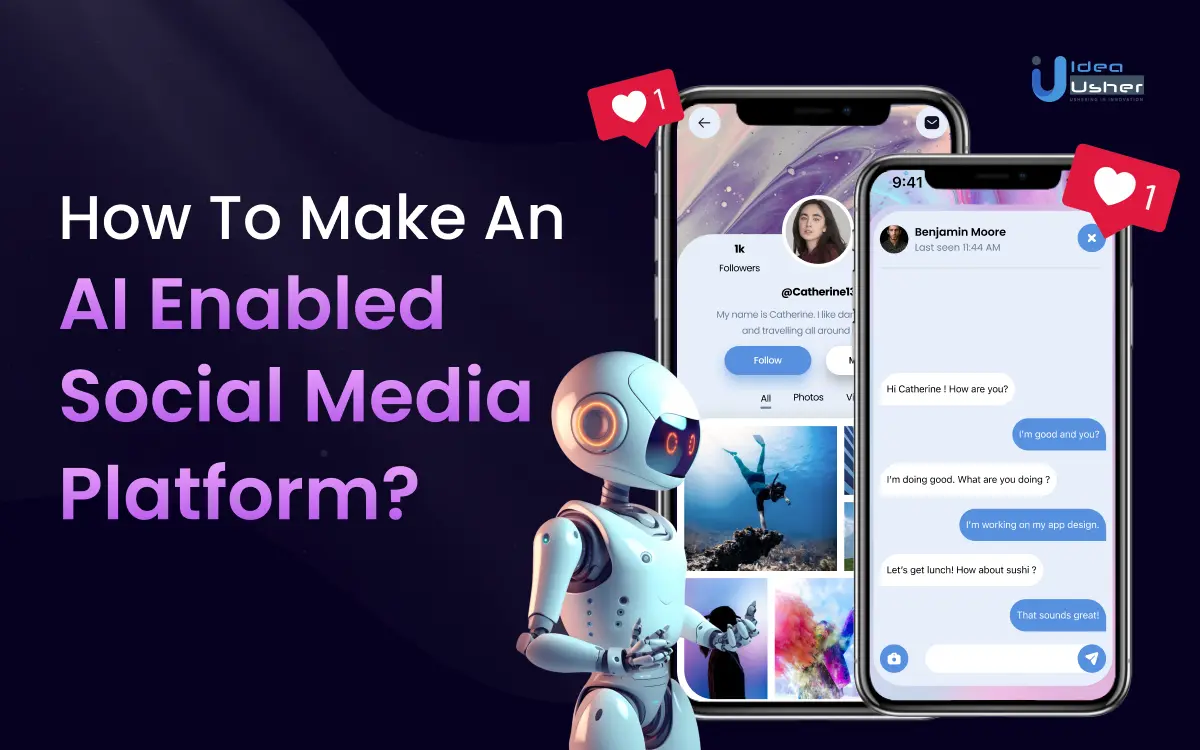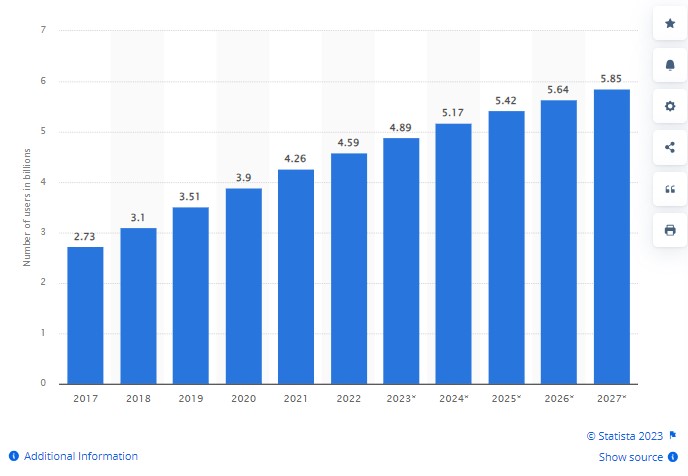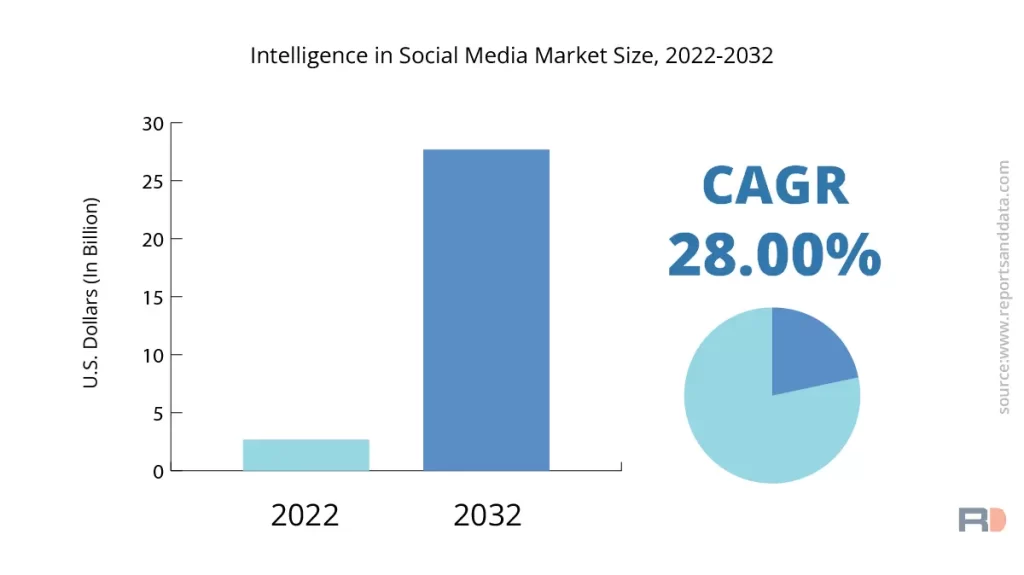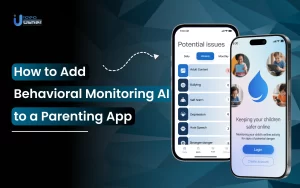AI has become integral to social media, offering various transformative tools such as automated post generators and image-creating bots. The continuous release of new AI-powered applications reflects the dynamic nature of social media technology. However, amidst this innovation, uncertainties persist regarding AI safety, security, and privacy in the social media domain. As we embrace the changes AI brings to social media, it’s crucial to stay informed about potential risks and safeguard personal and brand interests. This blog acts as a comprehensive guide, walking you through the process of developing an AI enabled social media platform. Covering key considerations, advantages, market insights, and potential challenges, it equips business owners—whether seasoned entrepreneurs or startup enthusiasts—with the knowledge needed to confidently navigate the evolving landscape of AI in social media.
What Is An AI Enabled Social Media Platform?
An AI-enabled social media platform integrates advanced artificial intelligence tools and services, empowering users to save time, enhance engagement, and distinguish themselves in the digital sphere. This transformative technology automates post creation, crafts and refines images and videos, optimizes posting schedules for maximum impact, facilitates seamless customer interactions, and delves into data analysis to discern user preferences and behaviors. From automated content generation to strategic scheduling and intelligent customer engagement, AI transforms social media into a dynamic and efficient space, offering users unprecedented capabilities to elevate their online presence and interactions.
Market Insight For AI In Social Media
As per Statista, the global count of active social media users reached an impressive 4.59 billion in 2022 and is expected to reach 6 billion by 2027. Concurrently with this substantial surge in social media user numbers, there is a growing demand for AI solutions aimed at comprehending and adapting to customer preferences.
Projections indicate that the AI market in social media is anticipated to achieve a valuation of $3,714.89 million by the year 2026, manifesting a Compound Annual Growth Rate (CAGR) of 28.77%.
Furthermore, an alternative report highlights that the 2021 valuation for the global artificial intelligence in the social media market was $992.7 million, with a projected escalation to $12 billion by 2031, reflecting a robust CAGR of 28.7% from 2022 to 2031.
Moreover, an additional source indicates that the market size for Artificial Intelligence in social media stood at USD 2.68 Billion in 2022, with an anticipated surge to USD 27.67 Billion by 2032, demonstrating a revenue CAGR of 28% throughout the forecast period.
The main factors driving market revenue growth are the global use of social media platforms and the increasing demand for advanced technologies to improve how businesses communicate with customers. In fact, It has been observed that social media has become a crucial source of valuable information about customers.
How Can AI Be Used In Social Media?
Artificial Intelligence (AI) can elevate your business strategies to unprecedented heights, unlocking invaluable insights and fostering personalized user experiences that yield tangible results. With the implementation of the right tools and strategies, businesses gain valuable insights, enhance user experiences, and drive conversions. Here are several impactful ways in which AI can be integrated into social media platforms for maximum effectiveness:
1. Advanced Caption Generation
Move beyond mundane captions with AI-powered caption writers. By inputting prompts, URLs, or hashtags, these tools generate captivating captions tailored to your brand’s tone and voice. This innovative approach eliminates clichés, saving time and enhancing engagement.
2. Content Personalization and Creation
AI plays a pivotal role in crafting personalized content experiences. Algorithms, driven by machine learning, analyze user interactions and past viewing history to curate feeds that align with individual preferences. Innovations like Lately and ChatGPT delve into generative AI, dynamically scaling campaign content and delivering human-like responses in natural language.
3. Content Ideation
AI-driven content ideation tools assist in overcoming creative roadblocks. By inputting keywords or topics, these engines generate fresh ideas for articles, blog posts, infographics, and videos, aligning with trending industry topics. Generative art tools facilitate visualizing and refining campaign ideas collaboratively.
4. Image Creation Revolution
Overcoming content creation bottlenecks, AI-driven image creation bots like Midjourney, Dall-E, Stable Diffusion, and DreamStudio transform ideas into custom, branded visuals effortlessly. These bots leverage machine learning to generate or modify images based on text descriptions, showcasing the power of generative AI in content creation. Another example under this context is Lensa AI, which uses the Stable Diffusion model and creates “magic avatars,” demonstrating the potential of generative AI in creating engaging content.
5. Strategic Insights
You can leverage AI-driven strategic insights to gain a competitive edge. Utilize tools for real-time sentiment analysis, influencer identification, and customized content recommendations. It helps in seamlessly monitoring industry trends and competitor activities to stay ahead in social media strategy. In influencer marketing, AI analyzes influencers’ data through NLP, providing insights into demographics and engagement. Additionally, computer vision technologies, including logo detection, enable brands to monitor logo visibility across social media platforms. This comprehensive approach ensures informed decisions and heightened visibility in the dynamic social media landscape.
6. Ad Campaign Optimization
You can optimize your social media ads with the prowess of AI. It excels in defining your target audience, honing bidding strategies, and adeptly managing budgets for unparalleled efficiency. These tools not only facilitate the selection of compelling creatives and copy but also streamline A/B testing and performance tracking, simplifying the creation of impactful campaigns. AI’s analytical finesse truly shines in ad management and optimization, scrutinizing various versions, segmenting audiences, and forecasting language effectiveness. The result? A substantial lift in click-through rates and conversions for your campaigns.
7. Social Media Monitoring at Scale
AI tools extend their influence to monitor social media activities across diverse use cases. This encompasses text and visual content creation, ad management, influencer research, and brand awareness campaigns, ensuring a holistic approach to social media management.
Benefits Of AI Enabled Social Media For Businesses
Since it is proven that social media is a crucial source of customer intelligence data, with integrated AI – it can act as your secret weapon for success. Let’s break down how using AI in your social media game can bring some serious benefits to business:
1. Elevated Efficiency and Time Savings
AI is like having a super helper that takes care of routine tasks, such as making posts, setting schedules, and dealing with customer questions. This efficiency boost empowers you to channel your efforts into refining your social media strategy and cultivating innovation.
2. Unparalleled Personalization
The power of AI lies in its ability to identify customer preferences and behaviors. AI-driven algorithms analyze vast datasets to gain insights into consumer needs, enabling businesses to deliver personalized and relevant experiences. This approach enhances customer engagement, satisfaction, and loyalty, ultimately driving business success.
3. Creative Brilliance
Creativity knows no bounds with AI-enabled social media tools. Overcoming challenges like writer’s block or resource limitations, these tools accelerate idea generation, paving the way for more creative and impactful marketing campaigns. Businesses can now unleash their creative potential and captivate audiences with fresh, innovative content.
4. Strategic Expansion
AI empowers businesses to monitor and comprehend conversations across diverse platforms. By extracting valuable insights from these interactions, businesses can tailor their content strategies to maximize engagement. This strategic use of AI ensures that businesses not only maintain but also expand their reach across the ever-evolving landscape of social media.
5. Cost-Efficient
AI can help you get rid of manual labor costs associated with traditional content creation and optimization processes. It streamlines operations, reducing both time and financial investments. This cost-efficiency enables businesses, regardless of size, to implement sophisticated social media strategies that yield a high return on investment (ROI).
6. Precision and Data-Driven Decision Making
AI-driven tools facilitate precise decision-making by leveraging data and insights. Businesses can target their audience with unparalleled accuracy, resulting in higher conversion rates and improved ROI for social media campaigns. The analytical power of AI transforms social media from a speculative venture into a data-driven engine for success.
Key Considerations For Developing A Social Media App
Here are key factors to guide you through the development process, ensuring a successful and responsible implementation:
1. Understanding AI
Before beginning, equip yourself with a solid understanding of AI. Identify its potential applications, associated risks, and the diverse range of AI models available. Familiarity with common types of AI models will be your compass in navigating the development journey.
2. Assessing Organizational Needs
Integrate AI to meet the unique needs of your organization. Conduct a thorough assessment to determine how AI can best serve your objectives. This clarity will shape the development roadmap, ensuring a seamless fit with organizational goals.
3. Navigating Regulatory Realities
Stay ahead of the game by researching and understanding the legal and regulatory requirements related to AI in your specific industry and jurisdiction. Compliance is key, and a proactive approach will save you headaches down the road.
4. Risk Mitigation
Identify potential risks associated with AI deployment. Develop robust strategies to mitigate these risks, safeguarding both the integrity of your application and the trust of your users.
5. Governance
Uphold ethical standards by establishing an AI ethics committee. This dedicated body will oversee AI usage, promote best practices, assess risks, and authorize periodic audits. A governance framework ensures responsible and transparent AI implementation.
6. Privacy
Prioritize user privacy by adhering to GDPR principles. Regardless of jurisdiction, these guidelines provide a solid foundation for safeguarding personal data and instilling user confidence.
7. Security Measures
Guard against security breaches by implementing a robust security management framework. Consider industry standards like ISO27001 to enforce confidentiality, integrity, and accountability in handling information assets.
8. Safety
Implement the principle of ‘safety by design.’ Initiate a safety impact assessment, particularly if your AI system has implications for human or product safety. Implement controls that align with the level of associated risk.
14 Must-Have Features For Your AI-enabled Social Media App
Here are some of the must-have features for your AI-enabled social media app that you must consider before beginning the development process with an experienced team:
1. Smart Content Feed Personalization
This feature employs advanced AI algorithms to study user behavior, preferences, and interactions on the platform. By analyzing this data, the app can dynamically personalize each user’s content feed, presenting them with posts, images, and videos that align with their interests, ensuring a more engaging and relevant user experience.
2. Engaging AI-Powered Chatbots
AI-driven chatbots serve as virtual assistants on the social media app. These intelligent bots can engage in real-time conversations with users, answering queries, providing assistance, and even offering customer support. Their responsiveness enhances user satisfaction and interaction on the platform.
3. AI-Assisted Content Creation
Leveraging AI in content creation allows users to generate text, images, and videos with assistance from smart algorithms. These tools may suggest captions, recommend visual elements, or even automate the creation process based on user preferences, providing a seamless and creative content generation experience.
4. Comprehensive Social Media Monitoring
AI-powered monitoring tools continuously track the platform for brand mentions, user sentiments, and overall activity. This comprehensive analysis offers insights into user perceptions, trending topics, and the general mood of the community, empowering the platform to adapt and respond effectively.
5. Precision Ad Targeting
AI is utilized to create, manage, and optimize advertisements on the platform. By analyzing user data, the app can precisely target ads to individuals who are more likely to engage with the content. This feature enhances the effectiveness of advertising campaigns, improving reach and engagement.
6. Creative Filters for Fun Experiences
Adding a playful element, this feature introduces creative filters powered by AI. Users can transform their photos and videos with various effects, from altering appearances to applying virtual makeup. These filters enhance user enjoyment and contribute to the uniqueness of the content shared on the platform.
7. Automatic Captioning and Translation
AI-driven automatic captioning and translation features enhance accessibility and global reach. The app can automatically generate captions for images and videos, making content more inclusive. Additionally, the translation feature breaks down language barriers, ensuring that users can engage with content in their preferred language.
8. Robust Moderation Capabilities
This feature utilizes AI algorithms for content moderation, flagging inappropriate content, and identifying spam. It ensures that community guidelines are enforced, maintaining a positive and secure online environment. The automated moderation process helps in swiftly addressing potential issues and promoting a respectful user experience.
9. Sentiment Analysis
AI-powered sentiment analysis evaluates the sentiment expressed in user comments and posts. This feature provides valuable insights into user reactions, allowing the platform to understand the overall mood of the community. These insights can be instrumental in adjusting strategies and content to align with user sentiment.
10. Voice Recognition and Command
Integrating voice recognition technology enables users to interact with the app using voice commands. This hands-free feature enhances accessibility and convenience, allowing users to navigate the platform and perform actions without the need for manual input.
11. Image and Video Recognition
AI-driven image and video recognition capabilities enable the app to identify objects, places, people, text, and actions within visual content. This feature enhances the organization and searchability of content, providing users with a more intuitive and efficient experience.
12. Predictive Analysis
Predictive analysis utilizes AI algorithms to forecast trends based on user behavior and interactions. By understanding patterns and preferences, the app can anticipate upcoming trends, assisting in the strategic planning of marketing campaigns and content creation.
13. User Verification
AI contributes to enhancing platform security through user verification. By employing advanced identification algorithms, the app can verify user identities, reducing the likelihood of fake accounts and bolstering overall security measures.
14. Recommendation Engine
The recommendation engine utilizes AI to suggest friends, pages, groups, and other content based on individual user preferences and behavior. This feature enhances user engagement by providing personalized recommendations, creating a more tailored and enjoyable user experience.
How To Make An AI Enabled Social Media Platform?
The first method includes the integration of AI tools into an existing social media platform. This typically involves the utilization of APIs offered by the developers of AI tools, enabling access to and incorporation of the tool’s functionalities into the application.
On the other hand, the second method involves developing a social media app from the ground up, incorporating distinct AI tools. This is a more intricate and time-intensive process, as it necessitates the development of AI tools or the customization of existing ones to align with particular requirements.
Both approaches come with their advantages and disadvantages, and the optimal choice hinges on specific needs, available resources, and expertise. Here, we will lay down the steps to develop a social media platform incorporated with AI features.
1. Define the Scope of Your Application
Outline the goals for your social media app, including any AI enhancements. Define features such as user profiles, posts, and interactions to set the foundation. Furthermore, identify what you want to achieve with AI in your social media app. Whether it’s making posts more personal, boosting user engagement, or using chatbots for customer support, setting clear goals is next to charting the course for your app’s AI venture.
2. Choose the Right AI Technologies
Next, carefully choose AI tools that fit your app’s needs. Determine the specific areas where AI can add value to your social media app. This could mean understanding post sentiments to grasp how users feel, suggesting content with machine learning to provide a customized experience, or recognizing images and videos to add a visual touch. This step might involve utilizing pre-existing AI tools or developing custom solutions based on the complexity of your requirements.
3. Integrate AI Tools (optional)
Seamlessly integrate AI into both the user interface and the backend. This might involve using existing AI tools or developing your own. Ensure they work well with both the user interface and the backend to serve the purpose. Here’s the step required to seamlessly incorporate existing AI functionalities:
3.1. API Integration
Leverage AI APIs (Application Programming Interfaces) provided by reputable AI service providers. These APIs offer ready-to-use functionalities such as natural language processing, image recognition, or recommendation algorithms. Integrate these APIs into your app’s backend to access AI features seamlessly. API works as a specialist that enhances your app’s capabilities and user experience.
3.2. Data Preparation
Ensure that your app’s data is well-prepared for AI integration. This involves cleaning and organizing data to facilitate effective training for machine learning models or to feed into AI algorithms.
4. Develop Custom AI Models (Optional)
If your app requires specialized AI capabilities, consider developing custom AI models. Train these models on your relevant data to make solutions specific to your app’s needs. This approach is complex, time-consuming, and requires experienced team members but, at the same time, creates ample space for your application to stand out in the marketplace. With this approach, you can have and offer greater flexibility and control over the AI functionalities in your app.
5. Develop a Robust Backend
Develop a robust backend infrastructure to serve as the base for your AI features. This involves coding the logic that processes data, communicates with AI models or APIs, and manages the results returned by the AI tools. This is a crucial step that lays the foundation for your app’s capabilities.
6. Design a User-Centric Interface
Design the user interface to seamlessly incorporate AI-driven features. Make sure that the interface enhances rather than complicates the user experience. Ensure that users can interact intuitively with AI features, whether it’s personalized content displays, chatbot interactions, or other AI-enhanced elements. Moreover, prioritize user experience in content creation, sharing, and interactions.
7. Implement AI in User Interface
Highlight AI-driven features in the user interface, whether it’s personalized content, helpful chatbots, or engaging augmented reality elements. Consider this as unveiling the distinctive and beneficial aspects of your app.
8. Ensure Data Privacy and Security
Prioritize user privacy and security through strong encryption and adherence to data protection rules. Building trust ensures users’ personal information is well-protected, and it also helps users to trust your app with their sensitive information.
9. Test and Iterate
Conduct thorough testing, paying special attention to AI components. Actively listen to user feedback, identify areas for improvement, and continuously refine your AI models. This iterative process is beneficial in the long run as, in the end, you will be offering a customized customer-centric app build for your customers.
10. Deploy the App
Once you’re satisfied with the current version of your app, release it. Ensure a flawless launch and stay vigilant for any potential issues that may arise, adhering to app store guidelines for both standard and AI-enhanced functionalities.
11. Monitor and Update
Monitor how your app performs after launch for general and AI features. Gather user feedback and data to find areas for improvement and update your app accordingly. This ongoing process ensures continuous growth and refinement.
12. Scale and Optimize
As more people use your app, ensure that your infrastructure and AI tools can handle increased demand without compromising performance. Optimize your AI for better performance and be ready for more users. Make sure that your app is ready to accommodate a growing user base or sudden rise in usage.
13. Stay Updated
Stay informed of the latest AI advancements and trending technology, and be prepared to incorporate new features or improvements to keep your social media app ahead of the curve. This continuous learning will help you stay updated and keep up with the market trends and new requirements.
Required Tech Stack For AI Enabled Social Media Platform
Here is the tech stack required for AI enabled social media platform:
| Technology | Description |
| Frontend Development | React.js, Angular.js, Vue.js |
| Backend Development | Python, Java, Ruby, Node.js |
| Database | PostgreSQL, MySQL (SQL), MongoDB (NoSQL) |
| User Interface Design | Design Tools: Sketch, Figma, Adobe XDResponsive Design: Bootstrap, Tailwind CSS |
| AI & Machine Learning | TensorFlow, PyTorch, Keras (Libraries); Google’s AutoML, Microsoft’s Azure AI (Cloud-based solutions) |
| Natural Language Processing | NLTK, SpaCy (Libraries); Google Cloud Natural Language API (Cloud solution) |
| APIs | Various APIs for social media integration and other services |
| Hosting | Amazon Web Services (AWS), Google Cloud, Microsoft Azure |
| Monitoring and Analytics | Logging: ELK Stack (Elasticsearch, Logstash, Kibana)Analytics: Google Analytics |
Top 6 Social Media Platforms Using AI
Here are some of your favorite platforms getting a high-tech boost from Artificial Intelligence (AI), making your experience more personalized and fun. Let’s break down how these leading platforms are using AI in a way that’s easy to understand.
1. Facebook’s Smart Understanding With Deep Text
Facebook is like a language expert with Deep Text. It checks out what you and others are saying in posts and comments, understanding all kinds of languages, slang, and even how excited someone is with exclamation marks. The AI also helps tag people in photos by recognizing faces. Plus, it can translate posts in your News Feed to make sure you’re always in the loop, no matter the language.
2. X’s Personalized Tweets With A Dash Of Safety
X is like a friend who knows exactly what you want to see. AI made it possible for your timeline to be filled with tweets related to your interests. It uses AI to keep things safe by tracking and removing inappropriate comments. It’s like having a digital superhero protecting your online space.
3. Snapchat’s With Machine Learning
Snapchat uses machine learning and adds animations to videos using AI and even understands hand gestures for more interactive experiences. Snapchat’s AI is all about making your snaps and videos stand out in creative ways.
4. Instagram’s Smart Moves for Your Feed
Instagram gets a boost from AI to make sure your feed is all about you. It personalizes what you see, targets ads to match your interests, and keeps away the spam. AI also helps organize and filter comments so that your interactions are positive and relevant. And when it comes to pictures, Instagram’s AI knows what’s in them, making it easier to discover cool stuff.
5. LinkedIn Leveraging AI Expertise
LinkedIn transforms your professional journey with AI. Seamlessly recommending jobs that match your skills, curating personalized content tailored to your interests, and actively identifying and flagging potential fraudulent profiles. LinkedIn’s AI ensures your experience is efficient, relevant, and secure.
6. Pinterest’s Picture-Perfect AI
Pinterest elevates your discovery game using AI magic. Crafting personalized pin recommendations by studying your behaviors and employing image recognition to make your visual exploration seamless and delightful. Pinterest’s AI adds a touch of magic to your pinning experience.
How AI In Social Media Affects Audiences?
Let’s understand another important aspect of your decision-making: Effects that AI enabled social media imparts on audiences, encompassing end users, marketers, and the social media companies coordinating this digital collaboration.
1. AI’s Influence on Social Media Companies
1.1. Content Moderation
AI algorithms function as vigilant gatekeepers, scanning and moderating content to uphold community guidelines and filter out undesirable material. This not only ensures a safer online environment but also helps maintain the integrity of the platform.
1.2. Content Recommendation
AI’s analytical prowess comes to the forefront in recommending tailored content to users. By analyzing user behavior and preferences, AI refines the content delivery process, enhancing user engagement and satisfaction.
1.3. Data Management
Managing datasets becomes a seamless operation with AI. Social media companies leverage AI-driven tools to sift through vast amounts of data, extracting valuable insights that inform decision-making and enhance overall platform efficiency.
1.4. Targeted Advertising
AI empowers precision in advertising by identifying user preferences and behaviors. Through targeted ad strategies, social media companies optimize marketing efforts, ensuring that users encounter content that aligns with their interests.
2. AI’s Impact on Marketers
2.1. Content Strategy and Scheduling
AI collaborates with marketers in crafting effective content strategies, including optimal scheduling for maximum visibility. This ensures that content reaches the right audience at the most opportune times.
2.2. Audience Segmentation
Marketers use AI in social media to analyze user data, helping create detailed audience segments. This personalized approach allows for more specific and impactful marketing campaigns.
2.3. Influencer Marketing
AI tools-enabled social media assists marketers in identifying and engaging with influencers whose audience aligns with their brand. This strategic approach optimizes influencer marketing, maximizing its impact.
2.4. Advertising Campaign Monitoring
AI, with its logo detection capabilities, becomes the vigilant eye-monitoring advertising campaign. Marketers can assess brand visibility and campaign effectiveness with greater precision.
2.5. Social Listening
Marketers harness AI-driven social listening tools to comprehend audience sentiments and track industry trends. This real-time insight aids in adapting marketing strategies to evolving consumer preferences.
3. AI’s Interaction with Social Media End Users
3.1. Content Personalization
AI transforms the end user’s social media experience through content personalization, suggesting posts and content tailored to individual preferences.
3.2. Automated Content Generation
From hashtag generation to text and video content creation, AI lends a helping hand to end users, streamlining the content creation process and fostering creativity.
3.3. Interactive AI Chatbots
Social media platforms integrate AI chatbots, providing end users with instant responses to queries. These chatbots enhance user engagement and offer efficient customer support.
3.4. Augmented Experiences
AI-powered video filters redefine self-expression on social media. Users can alter their appearance, fostering creativity and adding an element of playfulness to their content.
3.5. Third-Party Applications
End users have the option to amplify their social media experience by leveraging third-party applications integrated with AI. This includes tools for post-scheduling and content generation, enhancing user autonomy.
Integrating AI into social media has a profound impact, transforming the internal workings of companies while enhancing the experiences of marketers and users alike. This collaborative integration not only improves the efficiency of behind-the-scenes operations but also contributes to making social media more personalized, responsive, and enjoyable for everyone involved.
Top 10 Popular AI Tools For Social Media
Here are some AI tools designed to streamline content management, amplify engagement, and drive impactful results.
1. FeedHive
FeedHive introduces advanced content scheduling, offering customized schedules and event-based posting for an optimized social media presence.
2. Vista Social
Vista Social stands out as a comprehensive social media management platform, enabling scheduled content, follower engagement, performance analysis, and staying attuned to relevant conversations.
3. Buffer
Buffer, a stalwart in social media management, provides a robust suite of features. For the latest functionalities, refer to the official website.
4. Audiense
Audiense enhances Twitter strategies through intelligent social listening, tracking vital conversations, and delivering timely alerts with advanced filtering.
5. Ocoya
Ocoya transforms caption creation by leveraging AI to generate marketing text in 26 languages, ensuring a globally resonant message.
6. Predis.ai
Predis.ai is a go-to platform for dynamic content creation, generating captivating carousels and videos with real-time performance metrics.
7. Publer
Publer serves as an automation ally, encompassing post text and image generation, robust scheduling, and comprehensive analytics.
8. Jasper.ai
Jasper.ai revolutionizes content creation with machine learning-driven marketing copy, covering blog posts, product descriptions, ad copy, and social media captions.
9. AdCreative.ai
AdCreative.ai transforms advertising strategies with data-driven customized ad copy, images, and headlines.
10. Pictory
Pictory converts long-form content into shareable videos, utilizing AI to weave compelling visuals from blog posts, scripts, webinars, or recordings.
Challenges Of Developing An AI Enabled Social Media App
Developing an AI-enabled social media platform presents a host of challenges that demand careful consideration.
1. Safeguarding User Privacy
Utilizing AI in social media involves handling extensive user data, necessitating a robust commitment to privacy protection and vigilant prevention of potential misuse.
2. Tackling Algorithmic Bias
The natural learning nature of AI models introduces the challenge of algorithmic bias. Addressing this requires extensive efforts to ensure fairness in content recommendations and user interactions.
3. Combatting Information Integrity
The inadvertent distribution of misinformation poses a significant challenge. Ensuring the app can identify reliable information from falsehoods is important for maintaining content integrity.
4. Navigating Ethical Crossroads in AI
Ethical considerations play a pivotal role in AI deployment, urging the establishment of frameworks that prioritize responsible and user-centric AI practices.
5. Verifying Content Authenticity
The proficiency of AI in content generation prompts concerns about authenticity, especially in the context of emerging “deepfake” technologies. Implementing measures to verify and authenticate content becomes imperative.
6. Navigating Legal Complexities
Legal and copyright intricacies emerge prominently, necessitating a detailed understanding of intellectual property laws and a commitment to legal compliance.
7. Overcoming Technical Hurdles
The complexity of AI technology presents implementation challenges. Acknowledging these challenges and refining AI tools to comprehend the subtleties of human communication is integral to success.
8. Mitigating Risks and Ensuring Safety
The deployment of AI introduces inherent risks. Ensuring the safety of AI applications, protecting user privacy, and addressing broader societal implications requires a comprehensive risk mitigation strategy.
Case Study: Instagram And ‘AI Friend’
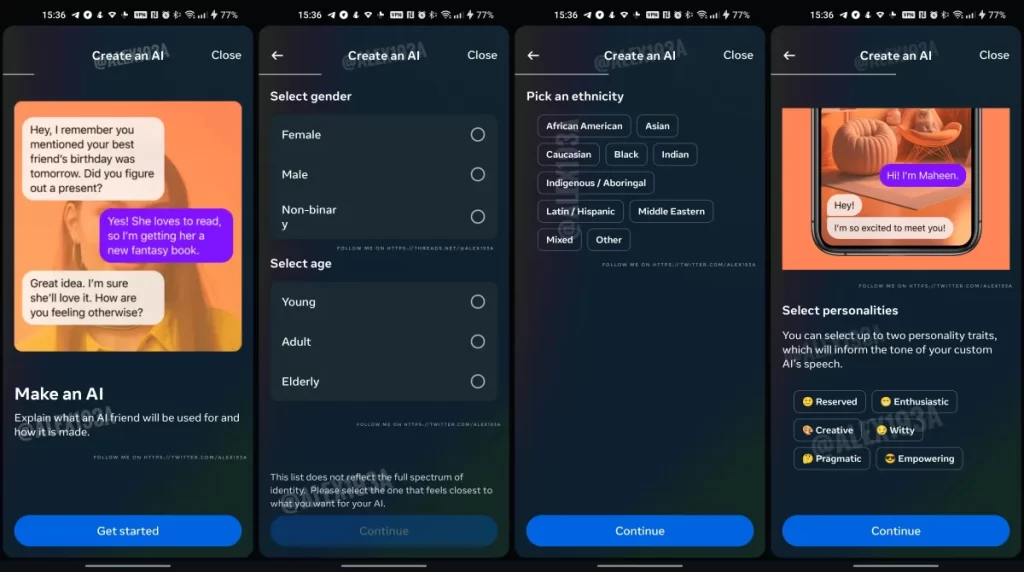
In a groundbreaking move, Instagram is in the developmental stages of introducing a customizable “AI friend” feature, allowing users to engage in personalized conversations with an artificial intelligence entity. App researcher Alessandro Paluzzi shared revealing screenshots indicating users can tailor their AI companion’s gender, age, ethnicity, personality, and interests. This innovative feature aims to enable users to discuss a range of topics, from answering questions to brainstorming ideas.
The customization process includes selecting personality traits such as “reserved,” “enthusiastic,” or “empowering,” reflecting Instagram’s commitment to user personalization. The AI friend’s interests, encompassing categories like “DIY,” “animals,” and “entertainment,” further refine its personality and conversation dynamics. Users can then choose an avatar and name for their AI friend before delving into a chat window to commence conversations.
Despite the exciting prospects, the development raises ethical concerns, notably regarding users potentially mistaking the AI for a real person. Julia Stoyanovich from NYU’s Centre for Responsible AI emphasizes the need for transparent interaction, emphasizing that users should always be aware they are engaging with an AI, not a human, to prevent vulnerability to manipulation.
This development follows Meta’s recent integration of generative AI into its apps, with Instagram introducing 28 AI chatbots featuring notable personalities. The “AI friend” chatbot, distinguished by its versatility in open-ended conversations, positions Instagram at the forefront of innovative AI integration in social media.
Conclusion
The development of an AI-enabled social media platform is a significant investment that can yield substantial benefits for businesses. It’s crucial to consider market trends, potential challenges, and the advantages AI can bring. However, the key to success lies in understanding AI and its application in social media. Therefore, you have to be well-informed and strategic in your approach. As AI continues to evolve, it will undoubtedly play a pivotal role in shaping the future of social media, making it an investment worth considering. Moreover, with advanced social media platforms, you can embrace transformative technology to stay abreast of industry developments and deliver unparalleled user experiences to your customers.
How Idea Usher Can Help?
It is imperative to build a partnership with a professional AI project development company like Idea Usher. Such partnerships bring a wealth of expertise, profound insights, and a comprehensive grasp of ever-evolving AI technologies, ensuring your app’s resilience, scalability, and ability to yield the desired outcomes. Our team is proficient in harnessing the power of AI to create innovative social media apps. We understand the intricacies of AI and its potential impact on user experience. By leveraging our expertise, businesses can navigate the complexities of AI integration, ensuring their social media app is not just another product in the market but a game-changer that sets new standards in the industry. Partner with us today to transform your vision into reality.
Work with Ex-MAANG developers to build next-gen apps schedule your consultation now
Contact Idea Usher at [email protected]
FAQ
Q. What is AI in social media?
AI in social media involves leveraging artificial intelligence technologies to automate tasks, enhance content creation, optimize user interactions, and analyze data, ultimately improving the overall functionality and user experience of social media platforms.
Q. In what ways can AI be employed within social media?
AI finds application in social media across diverse tasks, ranging from automating post creation and generating/editing images and videos to optimizing posting schedules, managing customer interactions, and analyzing user preferences or behavior.
Q. What are the advantages of integrating AI into social media practices?
AI contributes to the efficiency and effectiveness of social marketing and advertising campaigns. This involves AI-supported social listening and brand monitoring, the creation of AI-generated captions and creatives, and the optimization of both paid and organic data-driven scheduling and distribution.
Q. Why must you invest in the development of an AI enabled social media app?
Investing in an AI-enabled social media app is imperative for staying competitive. It enhances user experiences through automated content creation, personalized interactions, and data-driven insights. This strategic move ensures business growth, efficiency, and relevance while assuring customer retention.


